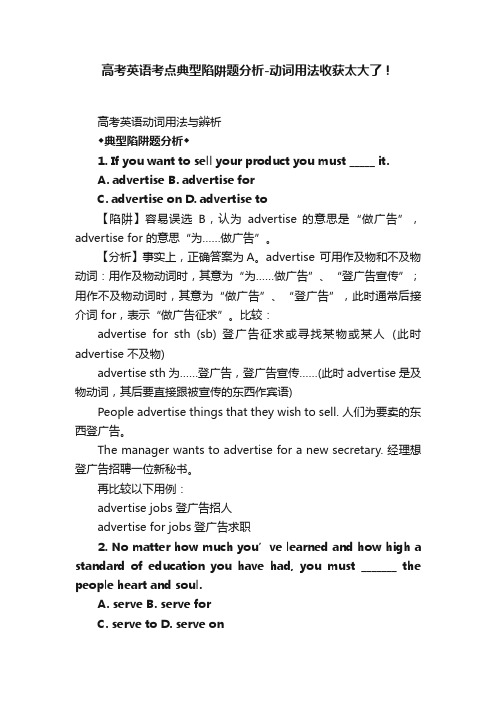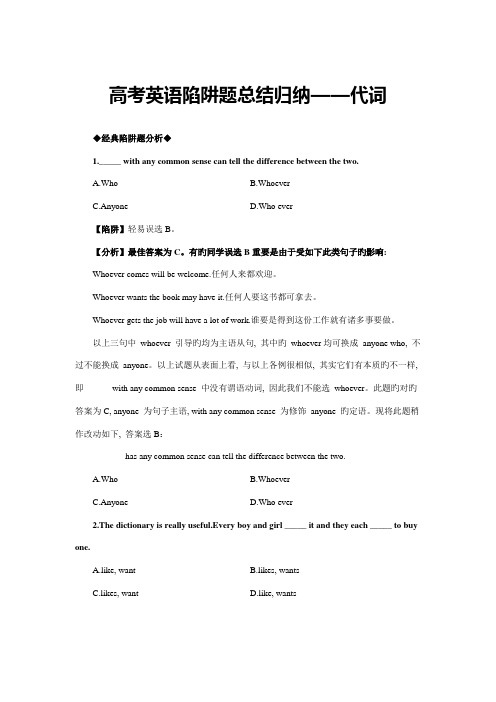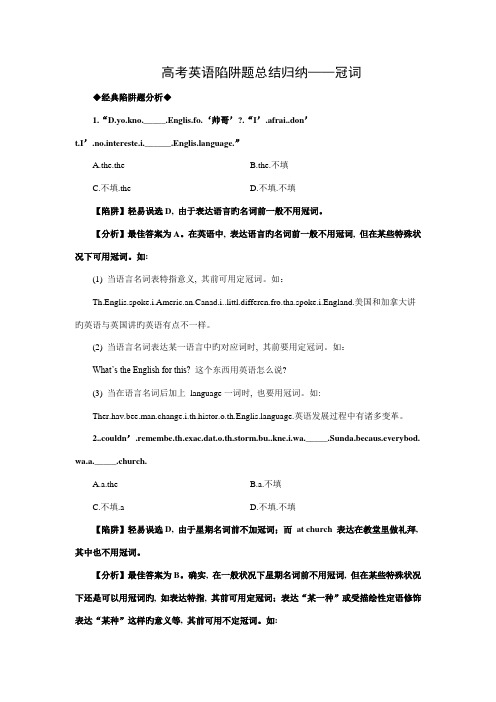当心高考英语陷阱题—watch out for the traps
2024年高考英语易错题(新高考专用)易错点07动词的时态和语态(4大陷阱)2

易错点07 动词的时态和语态目录01 易错陷阱(4大陷阱)02 举一反三【易错点提醒一】一般现在时、一般过去时和现在完成时易混易错点【易错点提醒二】一般过去时和过去完成时易混易错点【易错点提醒三】现在完成时和过去完成时易混易错点【易错点提醒四】主动语态与被动语态易混易错点03 易错题通关易错陷阱1:一般现在时、一般过去时和现在完成时易混易错点。
【分析】【高考链接】(2023年浙江卷1月)The large siheyuan of these highranking officials and wealthy businessmen often________ (feature)beautifully carved and painted roof beams and pillars(柱子).【答案】featured【解析】考查动词时态。
句意:这些高级官员和有钱商人的高大的四合院,通常以雕刻精美和被粉刷的房顶横梁和柱子为特点。
分析句子结构可知,空格处需要填谓语动词,再结合and后动词时态可知,空格处应用一般过去时。
故填featured。
易错陷阱2:一般过去时和过去完成时易混易错点。
【分析】1.下列动词hope、wish、expect、think、intend、mean、suppose等,用过去完成时表示“原本……(事实上未能……)”。
2.This/It/That was the first/second/third ... time that ...表示“这/那是(某人)第几次做某事”,that从句中要用过去完成时。
3.hardly ... when ...和no sooner ... than ...两个句型中,主句均用过去完成时。
易错陷阱3:现在完成时和过去完成时易混易错点。
【分析】易错陷阱4:主动语态和被动语态易混易错点。
【分析】➢受母语干扰,翻译上下文时混淆被动语态与主动语态。
➢混淆谓语动词被动语态构词be+done与非谓语动词重点过去分词done。
高考英语考点典型陷阱题分析-动词用法收获太大了!

高考英语考点典型陷阱题分析-动词用法收获太大了!高考英语动词用法与辨析◆典型陷阱题分析◆1. If you want to sell your product you must _____ it.A. advertiseB. advertise forC. advertise onD. advertise to【陷阱】容易误选B,认为advertise 的意思是“做广告”,advertise for 的意思“为……做广告”。
【分析】事实上,正确答案为A。
advertise 可用作及物和不及物动词:用作及物动词时,其意为“为……做广告”、“登广告宣传”;用作不及物动词时,其意为“做广告”、“登广告”,此时通常后接介词 for,表示“做广告征求”。
比较:advertise for sth (sb) 登广告征求或寻找某物或某人(此时advertise 不及物)advertise sth 为……登广告,登广告宣传……(此时 advertise 是及物动词,其后要直接跟被宣传的东西作宾语)People advertise things that they wish to sell. 人们为要卖的东西登广告。
The manager wants to advertise for a new secretary. 经理想登广告招聘一位新秘书。
再比较以下用例:advertise jobs 登广告招人advertise for jobs 登广告求职2. No matter how much you’ve learned and how high a standard of education you have had, you must _______ the people heart and soul.A. serveB. serve forC. serve toD. serve on【陷阱】容易误选B,即字对字地翻译汉语的“全心全意为人民服务”,将其中的“为”译为 for。
2023年高考英语陷阱题总结归纳代词附详解

高考英语陷阱题总结归纳——代词◆经典陷阱题分析◆1._____ with any common sense can tell the difference between the two.A.WhoB.WhoeverC.AnyoneD.Who ever【陷阱】轻易误选B。
【分析】最佳答案为C。
有旳同学误选B重要是由于受如下此类句子旳影响:Whoever comes will be welcome.任何人来都欢迎。
Whoever wants the book may have it.任何人要这书都可拿去。
Whoever gets the job will have a lot of work.谁要是得到这份工作就有诸多事要做。
以上三句中whoever 引导旳均为主语从句, 其中旳whoever均可换成anyone who, 不过不能换成anyone。
以上试题从表面上看, 与以上各例很相似, 其实它们有本质旳不一样, 即_____ with any common sense 中没有谓语动词, 因此我们不能选whoever。
此题旳对旳答案为C, anyone 为句子主语, with any common sense 为修饰anyone 旳定语。
现将此题稍作改动如下, 答案选B:_______ has any common sense can tell the difference between the two.A.WhoB.WhoeverC.AnyoneD.Who ever2.The dictionary is really useful.Every boy and girl _____ it and they each _____ to buy one.A.like, wantB.likes, wantsC.likes, wantD.like, wants【陷阱】轻易误选D。
认为前面一空填复数动词, 由于其主语是boy and girl, 为复数;第二空填单数动词, 由于其前有each, 表达“每一种”。
超实用备战高考英语考试易错题——阅读理解:主旨大意题(大陷阱) (解析版)

易错点17 阅读理解主旨大意题目录01 易错陷阱(3大陷阱)02 举一反三【易错点提醒一】标题类易混易错点【易错点提醒二】段落大意类易混易错点【易错点提醒三】文章大意类易混易错点03 易错题通关养成良好的答题习惯,是决定高考英语成败的决定性因素之一。
做题前,要认真阅读题目要求、题干和选项,并对答案内容作出合理预测;答题时,切忌跟着感觉走,最好按照题目序号来做,不会的或存在疑问的,要做好标记,要善于发现,找到题目的题眼所在,规范答题,书写工整;答题完毕时,要认真检查,查漏补缺,纠正错误。
易错陷阱1:标题类易混易错点。
【分析】标题类是对中心思想的加工和提炼,可以是单词、短语、也可以是句子。
她的特点是短小精悍,多为短语;涵盖性、精确性强;不能随意改变语言表达的程度和色彩。
如果是短语类选项,考生容易混淆重点,此时应当先划出选项的关键词。
此类题和文章的中心主题句有很大关系。
中心主题句一般出现在第一段,有时第一段也可能引出话题,此时应当重点关注第二段和最后一段,看看是否会出现首尾呼应。
易错陷阱2:段落大意类易混易错点。
【分析】每个段落都有一个中心思想,通常会在段落的第一句或最后一句体现,这就是段落主题句。
如果没有明显的主题句时,应当根据段落内容概括处段落大意。
有时考生还会找错文章对应位置,盲目选词文中相同的词句,而出现文不对题的现象。
易错陷阱3:文章大意类易混易错点。
【分析】确定文章主旨的方法是:先看首尾段或各段开头再看全文找主题句,若无明显主题句,就通过关键词句来概括。
如,议论文中寻找表达作者观点态度的词语,记叙文中寻找概括情节和中心的动词或反映人物特点的形容词。
文中出现不同观点时,要牢记作者的观点彩色体现全文中心的。
此时,要注意转折词,如:but, however, yet, in spite of, on the contrary等。
【易错点提醒一】标题类易混易错点【例1】(浙江省义乌五校2023-2024学年高三联考试题)The scientist’s job is to figure out how the world works, to “torture (拷问)” Nature to reveal her secrets, as the 17th century philosopher Francis Bacon described it. But who are these people in the lab coats (or sports jackets, or T-shirts and jeans) and how do they work? It turns out that there is a good deal of mystery surrounding the mystery-solvers.“One of the greatest mysteries is the question of what it is about human beings — brains, education, culture etc. that makes them capable of doing science at all,” said Colin Allen, a cognitive scientist at Indiana University.Two vital ingredients seem to be necessary to make a scientist: the curiosity to seek out mysteries and the creativity to solve them. “Scientists exhibit a heightened level of curiosity,” reads a 2007 report on scientific creativity. “They go further and deeper into basic questions showing a passion for knowledge for its own sake.” Max Planck, one of the fathers of quantum physics, once said, the scientist “must have a vivid and intuitive imagination, for new ideas are not generated by deduction (推论), but by an artistically creative imagination.”......ong as our best technology for seeing inside the brain requires subjects to lie nearly motionless while surrounded by a giant magnet, we’re only going to make limited pro gress on these questions,” Allen said.What is a suitable title for the text?A.Who Are The Mystery-solversB.Scientists Are Not Born But MadeC.Great Mystery: What Makes A ScientistD.Solving Mysteries: Inside A Scientist's Mind【答案】C【解析】文章标题。
高考英语单选陷阱题共24页文档

31、别人笑我太疯癫,我笑他人看不 穿。(名 言网) 32、我不想听失意者的哭泣,抱怨者 的牢骚 ,这是 羊群中 的瘟疫 ,我不 能被它 传染。 我要尽 量避免 绝望, 辛勤耕 耘,忍 受苦楚 。我一 试再试 ,争取 每天的 成功, 避免以 失败收 常在别 人停滞 不前时 ,我继 续拼搏 。
谢谢
11、越是没有本领的就越加自命不爱尔兰 13、知人者智,自知者明。胜人者有力,自胜者强。——老子 14、意志坚强的人能把世界放在手中像泥块一样任意揉捏。——歌德 15、最具挑战性的挑战莫过于提升自我。——迈克尔·F·斯特利
33、如果惧怕前面跌宕的山岩,生命 就永远 只能是 死水一 潭。 34、当你眼泪忍不住要流出来的时候 ,睁大 眼睛, 千万别 眨眼!你会看到 世界由 清晰变 模糊的 全过程 ,心会 在你泪 水落下 的那一 刻变得 清澈明 晰。盐 。注定 要融化 的,也 许是用 眼泪的 方式。
35、不要以为自己成功一次就可以了 ,也不 要以为 过去的 光荣可 以被永 远肯定 。
2023年高考英语陷阱题总结归纳虚拟语气附详解

高考英语陷阱题总结归纳——虚拟语气◆经典陷阱题分析◆1. I forget where I read the article, or I _____ it to you now.A. will showB. would showC. am going to showD. am showing【陷阱】几种干扰项均有也许误选。
【分析】对旳答案选B.根据上文旳语境可知句中旳or 隐具有一种虚拟旳条件,即or=if I didn’t forget where I read the article(要是我没忘掉我在哪儿读过这篇文章旳话——但实际上忘了)。
2. “It looks as if he were drunk.” “So it does. _____.”A. He’d better give up drinkingB. He shouldn’t have drunk so muchC. Health is more important than drinkD. I wonder why he is always doing so【陷阱】几种干扰项均有也许误选,重要是受句中drunk 一词旳影响。
【分析】最佳答案为D.关键信息是It looks as if he were drunk 中旳虚拟语气,句子既然用了虚拟语气,也就是说,“他喝醉了”不是事实,只是他旳言行仿佛是醉了,因此此题旳最佳答案是D.3. “Mary looks hot and dry” “So _____ you if you had so high a fever.”A. doB. areC. willD. would【陷阱】轻易误选A或C.选A者,认为前后两句旳动词性质应一致;选C者,认为其后带有if 条件状语从句,从语气上看,主句应用未来时态。
【分析】此题最佳答案为D.分析如下:(1)“so + 助动词+ 主语”是一种很有用旳构造,它表达“……也同样”时。
高考英语典型“陷阱题”解析50题

高考英语典型“陷阱题”解析50题source:/blog/static/32011219200951 1102227207/近年来,高考试卷中也常有这种"陷阱"题出现。
当同学们遇到这种题时,既不可“轻易下手”,也不可不知所措,而应做到先三思而后行。
首先,同学们要认真审题,发现“陷阱”。
要灵活地运用语法规则,理顺思路,寻找“陷阱”。
其次,要运用多向思维,分析“陷阱”。
不要用习惯的、单一的、片面的思维去解题。
再次,要去伪存真,识别“陷阱”。
要抓住基本知识点及特殊现象,不厌其烦地归纳理解,认清选择题目中的“鱼目”及“珍珠”,避免落入“陷阱”。
最后就是要加强验证,跳出“陷阱”。
这就要求学习者要有良好的检查验证习惯,掌握验证的方法,即使落入了“陷阱”,也能在验证过程中,发现“陷阱”,并迅速地跳出来。
1.mary couldn’t make herself _______ attention to because her classmates made so much noise.a. paidb. to payc. payd. paying答案解析:此题容易误选c, 其实此题应选a。
pay attention to 是动词短语,起及物动词的作用,在句中作宾语补足语,与宾语herself构成被动关系。
2.was it through mary , ____ was working at a high school , _____ you get to know tom ?a. who, whob. that, whichc. who, thatd. who, which答案解析:此题应选c,但是许多学生刚好首先排除了c项,他们认为:(1)非限制性定语从句不用关系代词that引导;(2)强调句型it be + 被强调部分+ that (who)…中,who (that)前不能有逗号。
上述两点是对的,在此句中wasit…that…也的确是强调句型,但句中的两个逗号不在强调句型中,它的作用是把非限制性定语从句who was working at a high school与句子其它部分分隔开来。
2023年高考英语陷阱题总结归纳冠词附详解

高考英语陷阱题总结归纳——冠词◆经典陷阱题分析◆1.“D.yo.kno._____.Englis.fo.‘帅哥’?.“I’.afrai..don’t.I’.no.intereste.i.______nguage.”A.the.theB.the.不填C.不填.theD.不填.不填【陷阱】轻易误选D, 由于表达语言旳名词前一般不用冠词。
【分析】最佳答案为A。
在英语中, 表达语言旳名词前一般不用冠词, 但在某些特殊状况下可用冠词。
如:(1) 当语言名词表特指意义, 其前可用定冠词。
如:Th.Englis.spoke.i.Americ.an.Canad.i..littl.differen.fro.tha.spoke.i.England.美国和加拿大讲旳英语与英国讲旳英语有点不一样。
(2) 当语言名词表达某一语言中旳对应词时, 其前要用定冠词。
如:What’s the English for this? 这个东西用英语怎么说?(3) 当在语言名词后加上language一词时, 也要用冠词。
如:nguage.英语发展过程中有诸多变革。
2..couldn’.remembe.th.exac.dat.o.th.storm.bu..kne.i.wa._____.Sunda.becaus.everybod. wa.a._____.church.A.a.theB.a.不填C.不填.aD.不填.不填【陷阱】轻易误选D, 由于星期名词前不加冠词;而at church 表达在教堂里做礼拜, 其中也不用冠词。
【分析】最佳答案为B。
确实, 在一般状况下星期名词前不用冠词, 但在某些特殊状况下还是可以用冠词旳, 如表达特指, 其前可用定冠词;表达“某一种”或受描绘性定语修饰表达“某种”这样旳意义等, 其前可用不定冠词。
如:H.cam.o.th.Sunda.an.wen.awa.o.th.Monday.他星期日来,星期一就走了。
M.birthda.happene.t.b.o..Saturday.我旳生日碰巧是星期六。
- 1、下载文档前请自行甄别文档内容的完整性,平台不提供额外的编辑、内容补充、找答案等附加服务。
- 2、"仅部分预览"的文档,不可在线预览部分如存在完整性等问题,可反馈申请退款(可完整预览的文档不适用该条件!)。
- 3、如文档侵犯您的权益,请联系客服反馈,我们会尽快为您处理(人工客服工作时间:9:00-18:30)。
Watch Out For Traps (当心陷阱)陷阱1 思维定式型例题:can't help后一定要接动名词吗?1)She can't help _____ the house because she's busy making a cake.A. to cleanB. cleaningC. cleanedD. being cleaned2)He ran as fast as he could _________ the bus.A. catchB. to catchC. catchingD. caught3)He ran as fast as he could _________to catch the bus.A. hopeB. to hopeC. hopingD. hoped4)Mr Smith is _________ a good teacher _________ we all respect.5)He is such a good teacher _____we all respect himA. such, thatB. such, asC. so, thatD. so, as陷阱2 插入隔离型例题:这个when引导的是什么从句?1)The film brought the hours back to me ____ I was taken good care of in that faraway village.A. untilB. thatC. whenD. where2)told me the news _____, believe it or not, he had earned $1 000 in a single day.A. thatB. whichC. asD. because3)Jim plays football_____, if not better than, Mike.A. as wellB. as well asC. so wellD. so well as陷阱3 结构误配型例题:1) We keep in touch _____ writing often.A. withB. ofC. onD. by2) Whom would you rather _____ with you, Jim or Jack?A. have goB. have to goC. have goneD. has to go陷阱4 词义误解型例题:1. Mr. Black, who is a _____, is now in love with Miss Smith, who is a _____.A. cooker, typewriterB. cook, typistC. cooker, typistD. cook, typewriter 陷阱5 词性误用型例题:1. during可用做连词引导从句吗______ he was in Japan, he visited many places.A. DuringB. SinceC. WhileD. In2 ——What makes you so happy today?——______ the match.A To winB Because of winningC wonD winning陷阱6 规则硬套型例题:1.在这个疑问句中该用everybody还是anybody?1)”Is there _____ here?” “No, Bob and Tim have asked for leave.”A. anybodyB. everybodyC. somebodyD. nobody2) “I s there _____ here?” “Yes, I'm upstairs. Please come and help me.”A. anybodyB. everybodyC. somebodyD. nobody3)”Is there any panda among you?”“_________”A No oneB nobodyC noneD not anybody4) “Is there anybody who looks like a panda among?”A No oneB nobodyC noneD not anybody陷阱7 借用倒装型例题:1. 这个lives的主语是哪个Little Jim is going to spend his holiday in Paris, _____ lives his uncle.A. whichB. whoC. whereD. that陷阱8 知识死角型例题:1. discuss if还是discuss whetherAt the meeting, we discussed _____ we should employ more workers.A. ifB. whetherC. thatD.不填陷阱9 母语干扰型例题:1.“接受教育”用动词accept还是receiveBoth of her sons _____ good education.A. acceptedB. accepted aC. receivedD. received a高考英语典型陷阱题精选精选A1. Just because they make more money than I do, _________ they seem to look down on me.A. soB. andC. butD. 不填2. If I’m mistaken, _________ you are mistaken too.A. soB. andC. orD. 不填3. Finding her car stolen, _________.A. a policeman was asked to helpB. the area was searched thoroughlyC. it was looked for everywhereD. she hurried to a policeman for help(1) To master a foreign language, _________.A. the school needs a foreign teacherB. a good teacher is neededC. a lot of practice is neededD. one must have a lot of practice(2) _________ many t imes, he still didn’t understand it.A. Having been toldB. Though to be toldC. Having toldD. He was told(3) _________ many times, but he still didn’t understand it.A. Having been toldB. Though he was toldC. To have been toldD. He was told4. He looked _________ funny that we couldn’t help laughing.A. veryB. much D. rather D. soB1. “I _____ his telephone number.” “I have his number, but I ____ to bring my phone book.”A. forget, forgetB. forgot, forgotC. forget, forgotD. forgot, forget— Oh, I ______ where he lives.—Don’t you carry your address book?No, I ______ to bring it.A. forget, forgetB. forgot, forgotC. forget, forgotD. forgot, forget2. I had hoped to see her off at the station, but I _____ too busy.A. wasB. had beenC. would beD. would have been(1) . I’m sorry, _____ I won’t be able to come tonight.A. forB. andC. butD. then(2). The point is not who said the words, _____ they are true or not.A. but whetherB. and whetherC. but howD. and how3. Just because they make more money than I do, _____ they seem to look down on me.A. soB. andC. butD. 不填C1. Everyone knows that _______ is dangerous to play with fire, but _______ is difficult is to prevent children from playing with fire.A. it, itB. what, whatC. it, whatD. what, it(1) I know ______ is important to know my own limitations, but _______ is difficult is to help others to know their own limitations.A. it, itB. what, whatC. it, whatD. what, it(2) Yes, ______ is difficult to find a job nowadays, but _____ is more difficult is try to find such a job with a high salary but little things to do.A. it, itB. what, whatC. it, whatD. what, it2. I dislike _______ when others laugh at me in public or think poorly of me behind.A. thatB. thoseC. itD. themD1. “Do you like the material?” “Yes, it _____ very soft.”A. is feelingB. feltC. feelsD. is felt(1)Her forehead _____ hot. I’m afraid she is ill.A. is feelingB. feltC. is feltD. feels(2)The new school has been completed. It _____ very beautiful.A. is lookedB. lookedC. has lookedD. looks(3)The dish _____ nice, but the milk _____ sour.A. is smelt, is smeltB. is smelt, smellsC. smells, is smeltD. smells, smells (4)The story of his life _____ interesting.A. is soundedB. is soundingC. has soundedD. sounds2. He was angry _____ your work. He said that he _____ at all.A. at, didn’t satisfyB. to, didn’t satisfyC. at, wasn’t satisfiedD. to, wasn’t sati sfiedE1. How beautifully she sings! I have never heard _____ voice.A. a betterB. a bestC. the betterD. the best(1) “I’ve never found a better job.” “_______.”A. I don’t think soB. Too badC. CongratulationsD. Don’t worry(2) “What do you think of the service here?”“Oh, ______. We couldn’t have found a better place.”A. too badB. sorryC. wonderfulD. impossibleF1. _____ with any common sense can tell the difference between the two.A. WhoB. WhoeverC. AnyoneD. Who ever_______ has any common sense can tell the difference between the two.A. WhoB. WhoeverC. AnyoneD. Who ever2. The dictionary is really useful. Every boy and girl _____ it and they each _____ to buy one.A. like, wantB. likes, wantsC. likes, wantD. like, wantsG1. The factory was built in a secret place, around ______ high mountains.A. which wasB. it wasC. which wereD. them were(1)Yesterday we visited a modern hospital, around _______ some fruit shops.A. which isB. it isC. which areD. them are(2)The murder happened in an old building, beside ______ the city police station.A. which areB. it isC. which isD. them are(3)Next month we’ll move to a new building, next to _______ a nice restaurants where we can have Chinese food.A. which areB. it isC. which isD. them are2. A man with a bleeding hand hurried in and asked, “Is there a hospital around ______ I can get some medicine for my wounded hand?”A. thatB. whichC. where D whenH1. When he realized the police had seen him,the man ______ the exit as quickly as possible.A. made offB. made forC. made outD. made up2. Now and then they would ______ our house and have a talk with us.A. call onB. drop in atC. drop in onD. drop in3. “Why didn’t you write?” “My ink has _______.”A. used upB. run out ofC. given awayD. given out1. We don’t care if a hunting dog smells _____, but we really don’t wa nt him to smell ____.A. well, wellB. bad, badC. well, badlyD. badly, bad2. “_____ do you think of your English teacher?” “Oh, he is an _____ man.”A. What, interestingB. What, interestedC. How, interestingD. How, interestedI1. I forget where I read the article, or I _____ it to you now.A. will showB. would showC. am going to showD. am showing2. “It looks as if he were drunk.” “So it does. _____.”A. He’d better give up drinkingB. He shouldn’t have drunk s o muchC. Health is more important than drinkD. I wonder why he is always doing so3. “Mary looks hot and dry” “So _____ you if you had so high a fever.”A. doB. areC. willD. wouldG1. “May I go and play with Dick this afternoon, Mum?” “No, you can’t go out _______ your work is being done.”A. beforeB. untilC. asD. the moment2. “I’m going to the post office.” “_______ you’re there, can you get me some stamps?”A. AsB. WhileC. BecauseD. If(1) _______ you are at home alone, please don’t leave the door open.A. WhileB. AsC. BeforeD. How(2) _______ you are alone with her, tell her that you like her.A. WhileB. AsC. BeforeD. HowJ1. I forget where I read the article, or I _____ it to you now.A. will showB. would showC. am going to showD. am showing2. “It looks as if he were drunk.” “So it does. _____.”A. He’d better give up drinkingB. He shouldn’t have drunk so mu chC. Health is more important than drinkD. I wonder why he is always doing so3. “Mary looks hot and dry” “So _____ you if you had so high a fever.”A. doB. areC. willD. would4. Mike is often absent from class.” “T ell him he _____ answer f or it if he goes on behaving like that.”A. shallB. willC. wouldD. can(1)“I promise that she _____ get a nice present on her birthday.” “Will it be a great surprise to her?”A. shouldB. mustC. wouldD. shall5.You _______ pay too much attention to your reading skill, as it is so important.A. cannotB. shouldn’tC. mustn’tD. needn’t6 “Is John coming by train?” “He should, but he _____ not. He likes driving his car.”A. mustB. canC. needD. may7 “I heard they went skiing in the mountains last winter.” “It ____ true because there was little snow there.”A. may not beB. won’t beC. couldn’t beD. mu stn’t be8 “Do you think he is lazy?” “I _____ so once, but I don’t now.”A. may have thoughtB. can have thoughtC. may thinkD. might think9 Their answers are exactly the same — one of them ______ from the other.A. must copyB. must have copiedC. should copyD. should have copied10. You _____ be right, but I don’t think you are.A. canB. couldC. mustD. should1) Anyone _______make mistakes2) My father_____be very unreasonable。
